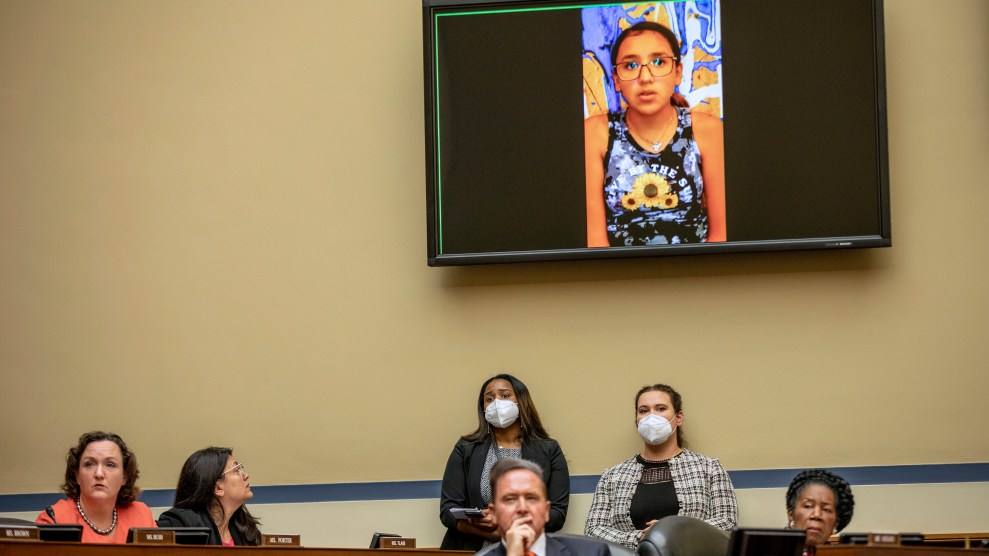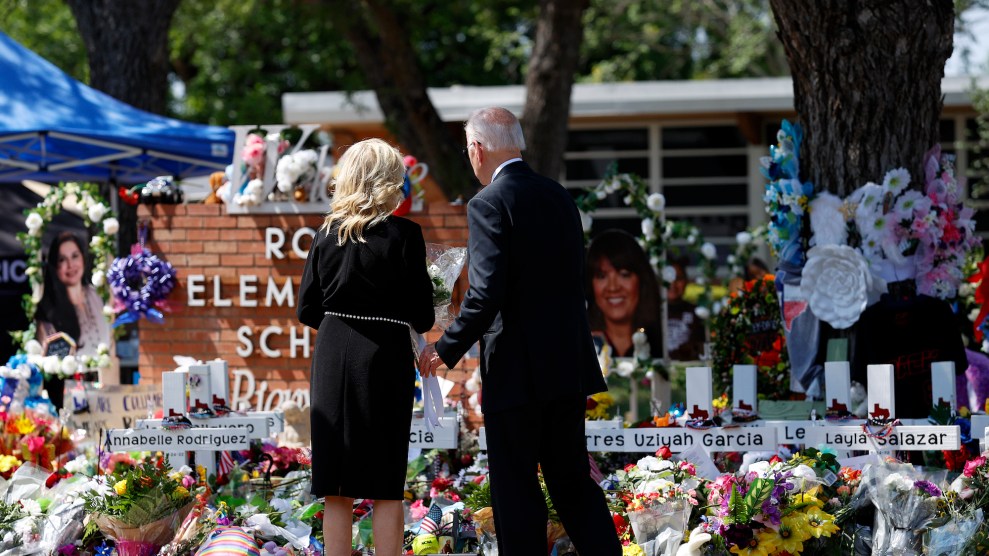
Miah Cerrillo, a fourth grader and survivor of the mass shooting in Uvalde, Texas, appears on a screen during a House hearing on gun violence.Jason Andrew/The New York Times/AP/Pool
Just two weeks after a gunman killed 19 children and two teachers at a Texas elementary school, Uvalde community members—including a doctor, a student survivor, and the parents of a child who died—have come together to plead for Congress to take action on gun control.
Dr. Roy Guerrero, an Uvalde pediatrician, tried to convey the horror of the day to the House Oversight Committee.
“What I did find was something no prayer would ever relieve: two children whose bodies had been pulverized by bullets fired at them, decapitated, whose flesh had been ripped apart, that the only clue to their identities was the blood-spattered cartoon clothes still clinging to them,” he said.
Guerrero said that he became a pediatrician because he admired children’s resilience and willingness to accept change. “Adults are stubborn,” he said. “Why else would there have been such little progress made in Congress to stop gun violence? Innocent children all over the country today are dead because laws and policy allow people to buy weapons before they’re legally old enough to even buy a pack of beer.”
Guerrero criticized one other habit of adults: their affinity for nostalgia. “Once the blood is rinsed away from the bodies of our loved ones and scrubbed off the floors of the schools and supermarkets and churches,” he said, “the carnage from each scene is erased for our collective conscience, and we return again to nostalgia, to the rose-tinted view of our Second Amendment as a perfect instrument of American life, no matter how many lives are lost.”
Miah Cerrillo, a student who survived the massacre, was the next to testify at the hearing via video. Cerrillo made headlines when she described covering herself in her classmate’s blood and playing dead. In her video appearance today, she described the gunman shooting her teacher in the head. Asked if she felt safe at school, Miah shook her head and said, “Because I don’t want it to happen again.”
Miah Cerrillo, the #Uvalde student who smeared blood all over herself during the shooting, says she doesn’t feel safe at school because she doesn’t “want it to happen again”
"Do you think it's going to happen again?"
Miah: -nods- pic.twitter.com/rie0zreopA
— philip lewis (@Phil_Lewis_) June 8, 2022
Miah’s father, Miguel Cerrillo, appeared at the hearing and choked back tears as he described how the shooting affected his daughter. “She is not the same little girl that I used to play with, run with, and do everything, because she was Daddy’s little girl,” he said. “I wish something would change, not only for our kids, but every single kid in the world, because schools are not safe anymore.”
Kimberly and Felix Rubio, the parents of 10-year-old Lexi Rubio, who died in the attack, appeared to remember their daughter, who wanted to go to college on a softball scholarship, major in math, and attend law school.
“We understand that for some reason—to some people, to people with money, to people who fund political campaigns—that guns are more important than children,” Kimberly said. She proposed a list of demands: a ban on assault rifles and high-capacity magazines, red flag laws, stronger background checks, and an increase in the age to purchase assault rifles in Texas from 18 to 21.
As her husband wiped tears from his eyes, Kimberly concluded, “Somewhere out there, there is a mom listening to our testimony, thinking, ‘I can’t even imagine their pain,’ not knowing that our reality will one day be hers, unless we act now.”













